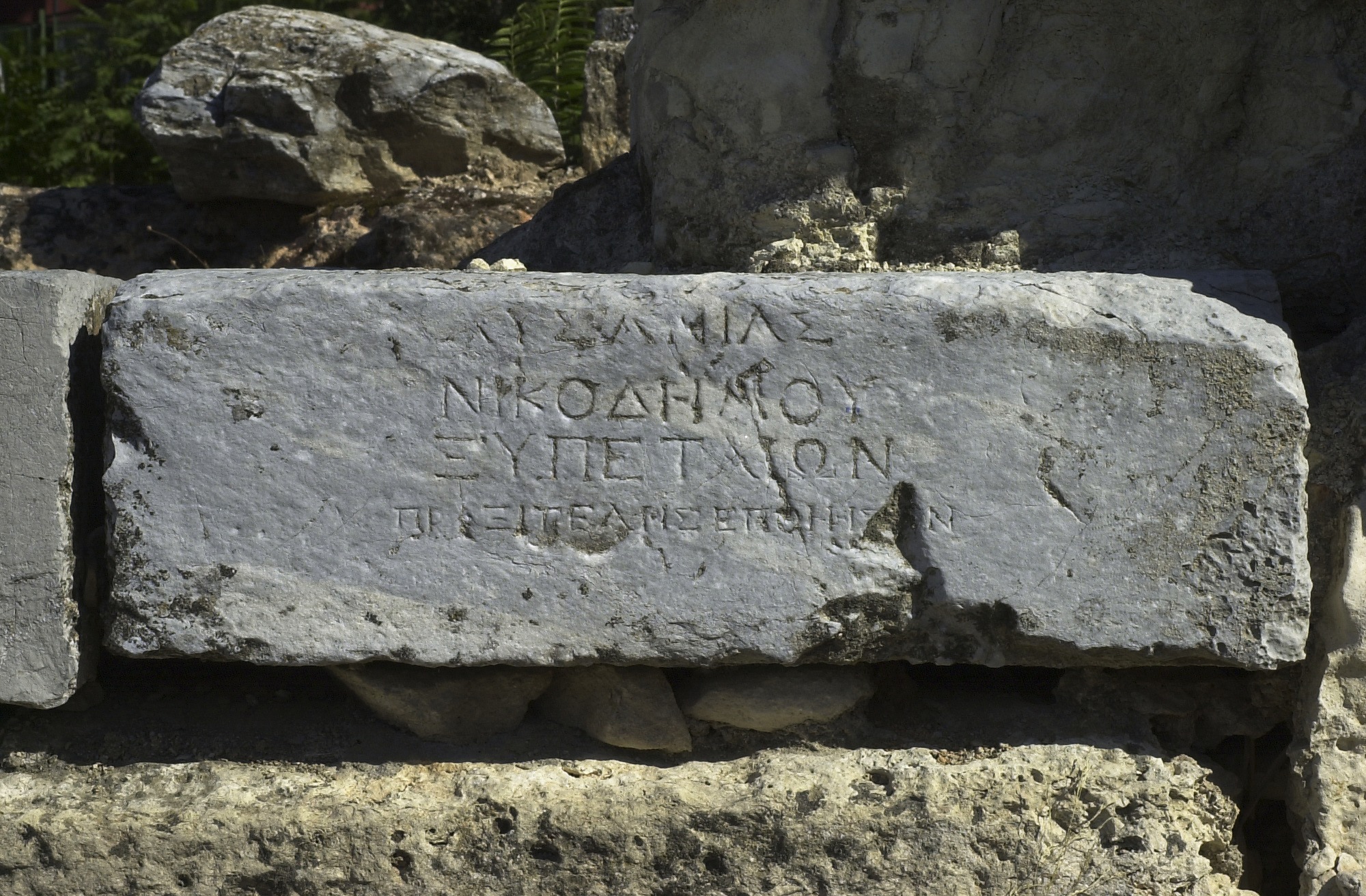17

The Future Tense: Consonant Stems
In the previous lesson, we learned the formula to form the future tense: verb stem + σ + –ω personal endings. If the verb stem ends in a CONSONANT, the addition of σ results in a number of predictable sound changes:
- If the verb stem ends in a labial (-π, –β, –φ), the addition of the σ results in ψ.
- If the verb stem ends in a dental (-δ, –θ and –ζ), the dental drops, leaving only the tense marker σ.
- If the verb stem ends in a palatal (-κ, –γ, –χ), the addition of the σ results in ξ.
These combinations affect only the pronunciation, not the meaning of the verb, but they do yield distinctive spellings. This lesson introduces new verbs, organized by the type of consonant that ends the stem.
Verb stems ending in a labial (-π, –β, –φ)
- ἅπτω ἅψω touch
- γράφω -ψω write, draw
- λείπω -ψω leave
- πέμπω -ψω send
- τρέπω -ψω turn
- τρέφω, θρέψω nourish (note the change in aspiration of the initial consonant!)
Verb stems ending in a dental (-δ, –θ and –ζ)
- θαυμάζω -σω wonder, marvel
- κατασκευάζω -σω equip, supply
- ὀνομάζω -σω call by name
- πείθω -σω persuade
- σῴζω, σώσω save (note the change in the use of the iota subscript in the penult!)
- φράζω -σω tell
Verb stems ending in a palatal (-κ, –γ, –χ)
- ἄγω -ξω lead, bring, pass (time)
- ὑπάγω -ξω go away
- ἄρχω -ξω begin, lead, rule (+ gen.)
- ὑπάρχω -ξω exist, be, belong to
- διδάσκω, διδάξω teach
- διώκω -ξω pursue
- ἥκω -ξω have come, be present
- λέγω -ξω say, tell
Verb stems ending in –ττ/-σσ
A number of verbs with stems ending in –ττ– in Classical Athenian Greek were treated as though they were palatals: i.e., –ττ + σ = ξ (S 513-514). These Athenian –ττ– verbs were spelled instead with –σσ– in most other Greek dialects, including Koine (Biblical) Greek (S 78). These words are the same with either spelling, as are their futures: both result in ξ.
- πράττω -ξω (πράσσω -ξω) do
- τάττω -ξω (τάσσω -ξω) arrange
- ὑποτάττω -ξω (ὑποτάσσω -ξω) subordinate, subject
- φυλάττω -ξω (φυλάσσω -ξω) watch, guard, defend
– τὸ τέλος –
Key Terms and Concepts
- FUTURE TENSE OF LABIAL VERB STEMS
- FUTURE TENSE OF DENTAL VERB STEMS
- FUTURE TENSE OF PALATAL VERB STEMS
- FUTURE TENSE OF –ττ/-σσ VERB STEMS
Vocabulary
Verb stems ending in a labial (-π, -β, -φ)
- ἅπτω ἅψω touch (+ gen. in middle)
- γράφω -ψω write, draw
- λείπω -ψω leave
- πέμπω -ψω send
- τρέπω -ψω turn
- τρέφω θρέψω nourish
Verb stems ending in a dental (-δ, -θ and -ζ)
- θαυμάζω -σω wonder, marvel
- κατασκευάζω -σω equip, supply
- ὀνομάζω -σω call by name
- πείθω -σω persuade (+ dat. in middle to mean “obey”)
- σῴζω, σώσω save
- φράζω -σω tell
Verb stems ending in a palatal (-κ, -γ, -χ)
- ἄγω -ξω lead, bring, pass (time)
- ὑπάγω -ξω go away
- ἄρχω -ξω begin, lead, rule (+ gen.)
- ὑπάρχω exist, be, belong to
- διδάσκω, διδάξω teach
- διώκω -ξω pursue
- ἥκω -ξω have come, be present
- λέγω -ξω say, tell
Verb stems ending in -ττ/-σσ
- πράττω -ξω (πράσσω -ξω) do
- τάττω -ξω (τάσσω -ξω) arrange
- ὑποτάττω -ξω (ὑποτάσσω -ξω) subordinate, subject
- φυλάττω -ξω (φυλάσσω -ξω) watch, guard, defend
Exercises
Ι. Conjugate the following verbs in the FUTURE, active, indicative in all persons and numbers, as well as in the infinitive:
- ἄγω
- γράφω
- πράττω
- πείθω
ΙΙ. For the following verbs and infinitives, 1) Translate the form in English; and 2) Change the form to the present tense.
- λείψετε
- λέξουσιν
- φράσομεν
- ὑποτάξει
- ὀνομάσειν
- παύσομεν
- ἥξεις
- θαυμάσει
- πέμψειν
- τρέψω
